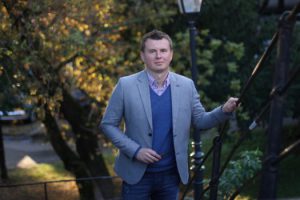Russia’s identity and foreign policy: understanding the roots of the international crisis
When?: March 1st 2022, 3:15pm
Where?:https://mau-se.zoom.us/j/64913784119
The seminar will focus on the role of identity in Russian foreign policy making and the trajectories that Russian identity formation has followed since the break-up of the Soviet Union. What are the main Russian concepts of the collective Self and how have they been connected to the Western Other? What is the function of supranational identitary constructs such as Eurasianism or Russian civilizationism? What role did identity play in the 2014 Ukraine crisis and the current tensions around Ukraine? How does the authoritarian regime in Russia instrumentalize identity? What are the possible policy implications and how should we approach Russian behavior based on our understanding of identity?

Dr. Aliaksei Kazharski received his PhD from Comenius University in Bratislava (Slovakia) in 2015. As a doctoral student, he spent time as a guest researcher at the University of Oslo (Norway), University of Tartu (Estonia) and the Institute for Human Sciences in Vienna (Austria). He has also been a visiting researcher at the University of Vienna and has worked as a researcher and lecturer at Charles University in Prague (Czech Republic) and Comenius University in Bratislava. Aliaksei’s doctoral dissertation was published by Central European University Press as a monograph in 2019 (Eurasian Integration and the Russian World: Regionalism as an Identitary Enterprise). He has also contributed to the work of regional think tanks and debate platforms such as the GLOBSEC Policy Institute and Visegrad Insight. Aliaksei’s main areas of research have been Central and Eastern Europe, Russia, regionalism and regional integration, and identity in international relations. He has published his scholarship on these subjects in Geopolitics, Problems of Post-Communism and other academic journals with an international impact.


